Every serious business is well aware of everything going on in the market. Be it the newest trends, their respective campaign results, or their competitors’ efforts. And one of the fundamental ways to gain this information is by tracking corresponding keywords.
💡 Read Brand Reputation 101: Monitoring, Analysis, and Management Tools
Keywords in this context may be anything from your company name to your competitors or key people. However, one group of keywords is extremely important.
And these are branded keywords, in particular.
In this blog we’ll go through the definition of branded keywords, we’ll explore how to track them and explain how this benefits your business.
Let’s start by defining branded keywords.
What Are Branded Keywords
Branded keywords are words and phrases which are directly connected with your brand name, products or services. They can be either their full names or abbreviations or colloquial expressions people use in everyday communication.
A full brand name would be for example McDonalds, its colloquial or alternative nam would be McDo (as said in France) and their product would be Big Tasty or McDrive as their service.
There are several ways you can find these keywords. You can discover them either in the search results, on websites or forums, through mentions or hashtags on social media or by using a media monitoring tool. The latter will allow you to discover colloquial branded keywords in conversations that don’t tag your official social media platforms.
Read How to Efficiently Track Mentions Online
Why to Track Branded Keywords
Apart from getting a complete overview of how much and in what contexts your branded keywords are used, tracking them can play a significant role in measuring your brand reputation and the impact of your campaigns, conducting market research and competitor analysis.
Let’s take a look at respective use cases.
Track Your Brand Reputation
One of the essential elements of your brand is its brand reputation.
The thing is – it may be completely different from what you’ve had in mind initially. You may have invested a ton into your visual identity, tone of voice, product packaging, website, etc., but what ultimately shapes your reputation is what your audience thinks about you. And this can be influenced by a range of actions from your part.
Let’s take a look at this untagged mention on Twitter:

If you were a representative of Starbucks, you could easily engage in this conversation by providing an extra discount or some other nice gesture and give your reputation an additional positive push.
Read Brand Reputation Management: Top 5 Tips for Success
Something along these lines happened with Loganair a couple of years ago. Long story short – one of their flight attendants saw a despreate plead from a mother looking for her son’s lost teddy bear on social media, called the lost-and-found of the airport they visited, found the teddy bear and sent it to them. Loganair made an amazing social media story around it, boosting ther brand reputation.
Measure the impact of your campaigns
Suppose you come up with what you think is an amazing new campaign. You launch it, waiting impatiently for the world to be awed. And the results turn out to be far from what you’ve expected. And not in a good way. How will you know where you’ve gone wrong?
Again, it’s branded keywords and tracking of these conversations that will give you the full picture.
Remember Burger King and their Women’s Day Campaign disaster?
With the intention of pointing out to the fact that only 20% of professional chefs are women, Burger King UK tweeted this:

And things started running downhill very quickly.
The whole course of a marketing campaign can easily be tracked through media monitoring tools. You can track the sentiment changing from day to day, check particular mentions of your branded keywords and dig a bit deeper into the reactions.
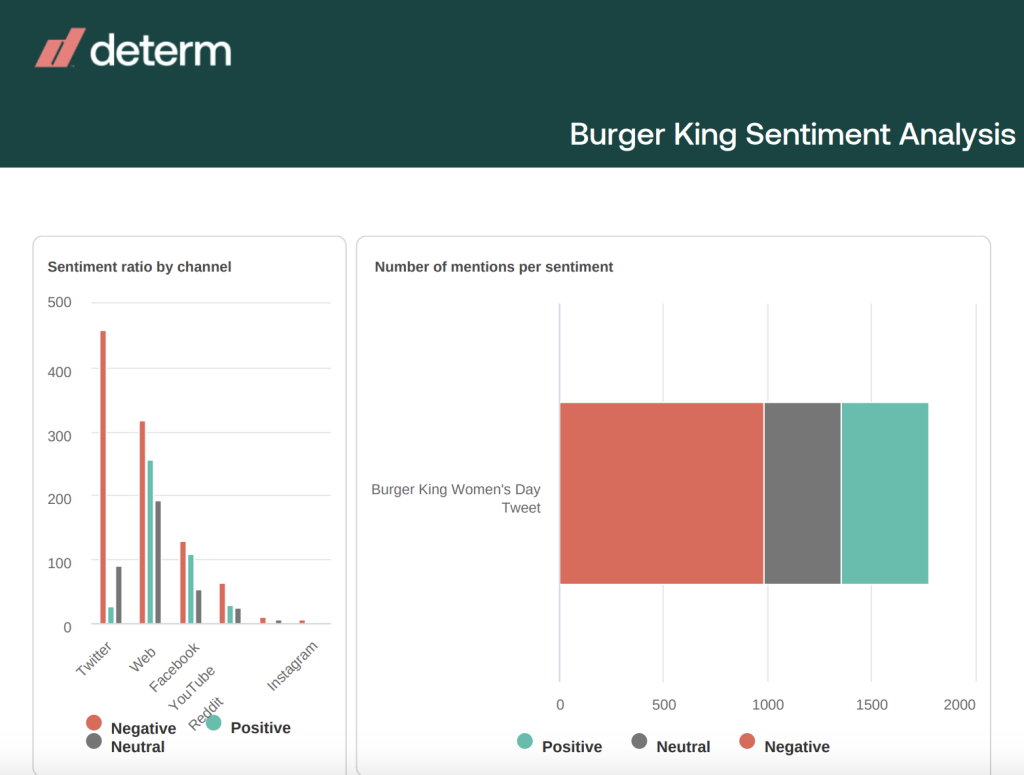
Conduct market research
Conversations around your branded keywords can also reveal a lot of useful information that may help direct your further business efforts, whether we’re talking about customer profiling, or specific market features.
For example, if we take a look at Starbuck mentions again, this mention may be a very useful piece of information. Being a global brand, it’s important to be aware of the cultural differences, and in this case food for thought when thinking about further expansion plans.
Read How to Do Market Research With a Media Monitoring Tool

In addition, you might want to take a look at the conversations to find out more about the trends. If you’re a large company that has multiple similar product lines under your wing, it may be useful to find out how the audience differentiates between them and invest your efforts into using that in your further strategies.
A look at Inditex brands
Let’s take Inditex for example. They are famous for owning multiple fashion brands like Zara, Bershka, Stradivarius, Pull&Bear, Oysho and Massimo Dutti. One look at the word cloud around the brands may discover how people usually differentiate between them:
Read How Determ’s Word Cloud Helps You Find Brand Information
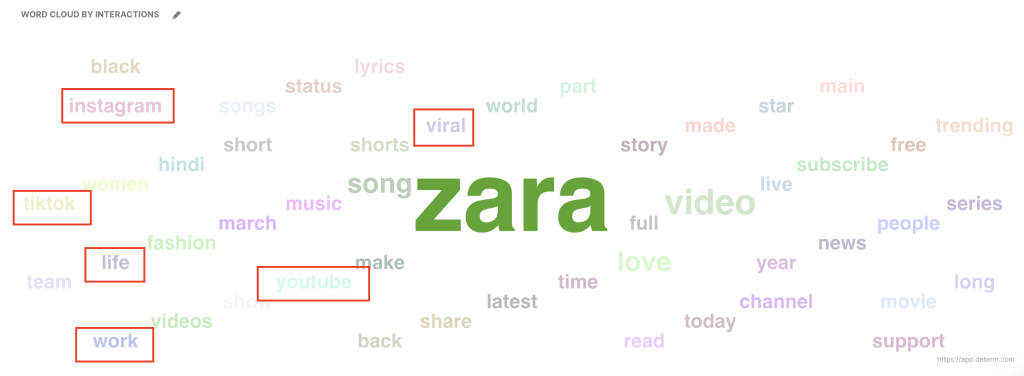
If we take a look at the word cloud around Zara, we can see that it is mainly used alongside the word work, meaning that their clothes are popularly worn at work and we can also notice that there are numerous social media platforms mentioned, as well as the word viral and vides, which points to the fact that people notice that the brand is very present on social media through videos. This may be a great encouragement for the Zara team to invest more into their social media strategy and play with the notion of clothes for work.
Read 10 Amazing Brand Collaborations that You Should Take a Look at
Bershka on the other hand has this word cloud:
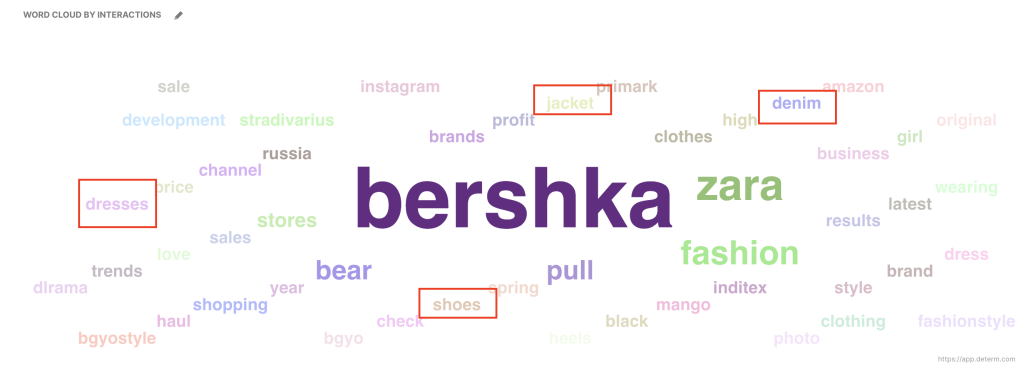
Here, we can see that specific clothing items mainly appear in relation to Bershka, which can be an incentive for the Bershka team to look a bit closer into these mentions and find out whether it is positive or negative, and use this in their planning.
In addition, you can take a look at the emojis your clients mostly use alongside the mentions of your branded keywords and use them in your communication as well.
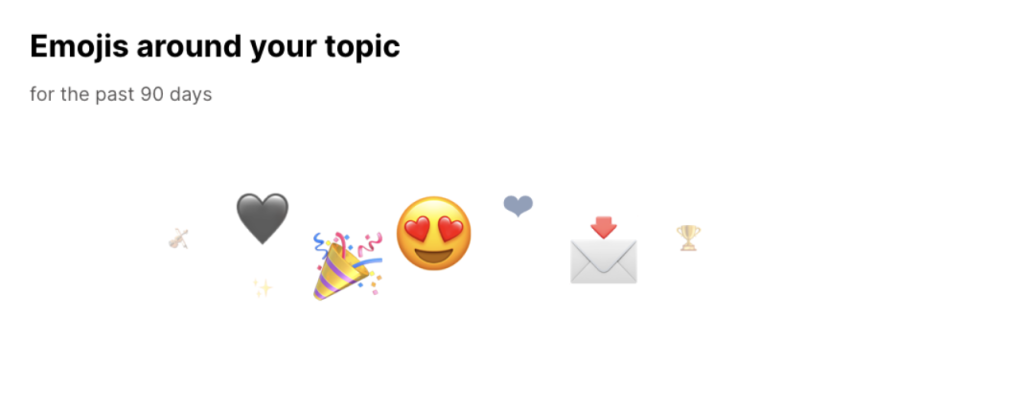
How to Track Your Branded Keywords
Well, it’s really simple actually – you can focus on taking a look at your notifications and mentions where your brand is tagged (and miss out on everything else) or implement a media monitoring tool like Determ.
With Determ, you can set up all your branded keywords as topics, as well as your competitors, and get all relevant mentions in one dashboard. And these include mentions from more than 100 million online sources like:
- Websites
- Social media platforms (Facebook, Instagram, Twitter)
- YouTube
- Forums
- Tripadvisor
and many more.
What do you get with Determ
Once you collect the mentions, Determ allows you to filter through the feed by location, language, sentiment and influence score. It also provides a range of predefined or custom reports where you can get a clear overview of the collected information. Within the reports you can easily see if there are certain unusual peaks in the number of mentions at specific times or in the positive/negative sentiment. You can observe the word cloud around your branded keywords and compare your keywords to your competitors to see the share of voice or impressions and find out where you’re missing out.
In addition, you can set up real-time alerts and get notified whenever there is an unsual increase of your branded keywords within a certain period of time. And this is just the beginning – the tool offers an abundance of options that will provide clear actionable results you can use immediately in your decision-making processes.
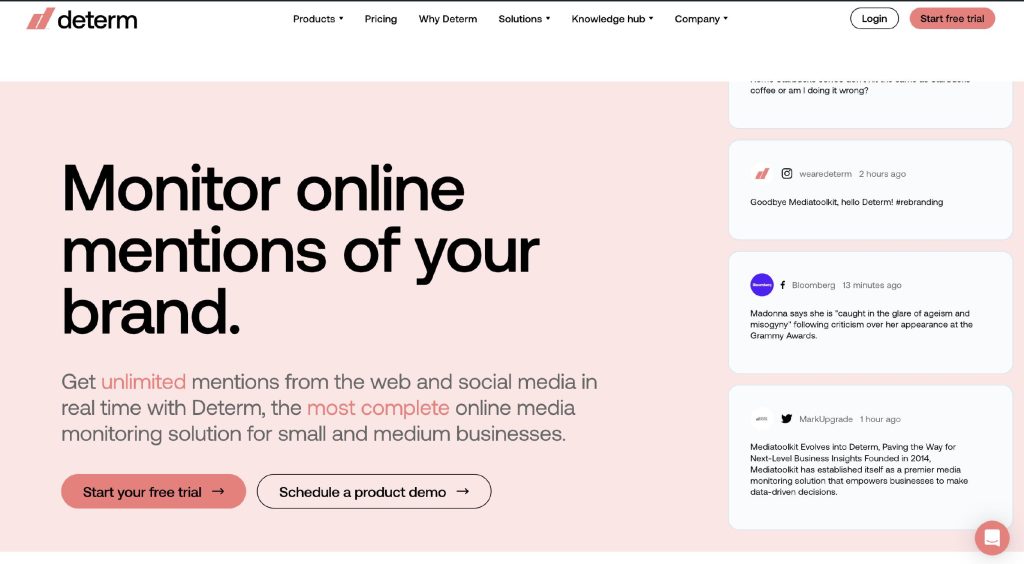
To Conclude
Tracking your branded keywords is a must if you’d like to have a full overview of your brand image. With Determ, you’re getting valuable information in one place, speeding up your processes and fueling your business decisions with reliable -from-the-market insights that you couldn’t get a hold of through checking only your mentions.
If you want to give Determ a test ride, we’d be happy to assist you!